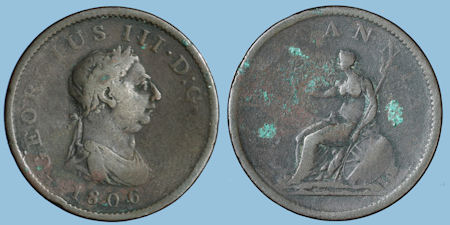| ← George II | George IV → |
Great Britain: George III
1760 to 1820
 Denomination: AR Shilling 1787
Denomination: AR Shilling 1787
Obverse: Older laureate and draped bust right. "GEORGIVS * DEI * GRATIA *" Reverse: Cruciform shields with crown in each quadrant. "* M * B * F * ET * H * REX * F * D * B * ET *N *L * D * S * R * I * A * T * ET * E * " "1787" in exergue. Dia/Wgt: 25.5 mm/ 6.0 gm Reference: SCBC 3746 |
 Denomination: AE "Cartwheel" Twopence, 1797
Denomination: AE "Cartwheel" Twopence, 1797
Obverse: Bust right. "GEORGIVS III D:G. REX" Reverse: Britannia seated."BRITANNIA/ 1797" Dia/Wgt: 40.9 mm/ 56.4 gm Reference: SCBC 3776 |
 Denomination: AE "Cartwheel" Penny, 1797
Denomination: AE "Cartwheel" Penny, 1797
Obverse: Bust right. "GEORGIVS III D:G. REX" Reverse: Britannia seated."BRITANNIA/ 1797" Dia/Wgt: 35.8 mm/ 27.3 gm Reference: SCBC 3777 |
 Denomination: AE Penny, 1806
Denomination: AE Penny, 1806
Obverse: Bust right. "GEORGIVS III D:G • REX/ 1806" Reverse: Britannia seated."BRITANNIA" Dia/Wgt: 34.0 mm/ 18.0 gm Reference: SCBC 3780 |
 Denomination: AE Halfpenny, 1806
Denomination: AE Halfpenny, 1806
Obverse: Bust right. "GEORGIVS III D :G • REX •". Date under bust. Reverse: Britannia seated."BRITANNIA" Dia/Wgt: 28.5 mm/ 9.0 gm Reference: SCBC 3781 |
 Denomination: AR Crown, 1820
Denomination: AR Crown, 1820
Obverse: Laureate head right "GEORGIUS III D:G: BRITANNIARUM REX F:D:" "1820" Edge "DECIUS ET TUTAMEN ANNO REGNI LX" Reverse: Pistrucci's St. George and dragon within Garter edge inscribed. "HONI SOIT QUI MAL Y PENSE" Dia/Wgt: 37.8 mm/ 27.7 gm Reference: SCBC 3787 |
 Denomination: AR Sixpence, 1816
Denomination: AR Sixpence, 1816
Obverse: Bust right. "GEOR III D:G: BRITT: REX F:D:/ 1816" Reverse: Crowned shield in garter. "HONI SOIT Q MAL Y PENSE" Dia/Wgt: 19.4 mm/ 2.8 gm Reference: SCBC 3791 |
 Denomination: AE Halfpenny, 1805
Denomination: AE Halfpenny, 1805
Obverse: Bust with short hair right."GEORGIUS III D.G. REX" Reverse: Irish harp, crown above "HIBERNIA" Dia/Wgt: 28.8 mm/ 9.6 gm Reference: KM 147.1, CSII 6621 |
|
George III (1738-1820), King of Great Britain and Ireland, (House of Hanover) (25th October 1760 to 29th January 1820), presided over the loss of Britain's American colonies; he was also Elector of Hanover (1760-1815) and, by decision of the Congress of Vienna, King of Hanover (1815-1820). George was born in London on June 4, 1738, the eldest son of Frederick Louis, prince of Wales, and the grandson of George II. The first of the Hanoverian house to be born and educated as an Englishman, he was primarily interested in his royal prerogatives as King of Great Britain-in contradistinction to his two predecessors, to whom Hanover was the main concern. George's aim was to rule as well as reign, and he was a skilful and astute intriguer; by 1763 he had managed to regain many of the powers that strong Whig ministries had appropriated during the reigns of the first two Georges. His problem was that he lacked the self-confidence and the mature statesmanship to form and achieve any long-term policy. After the dismissal of several ministers who did not satisfy him, the king found a firm supporter in Frederick North, 2nd Earl of Guilford, Prime Minister from 1770 to 1782. Lord North executed the royal policies that provoked the American War of Independence. The unsuccessful conclusion of that protracted conflict forced North to resign, and during the governmental crisis that followed-when three cabinets came and went in less than two years-the king himself was almost induced to abdicate. He then took a political gamble by placing the government in the hands of the 24-year-old William Pitt, thereby restoring stability for the rest of the century. In line with his belief in royal authority, George favoured the wars with France (1793-1815) that grew out of the French Revolution. In 1809 the king became blind. As early as 1765 he had suffered an apparent dementia, and in 1788 his derangement recurred to such a degree that a regency bill was passed, but the king recovered the following year. It is now thought likely that he had inherited porphyria, a defect of the metabolism that may in time lead to delirium. In 1811 he succumbed hopelessly, and his son, later George IV, acted as regent for the rest of his reign. George III died at Windsor Palace on January 29, 1820. |